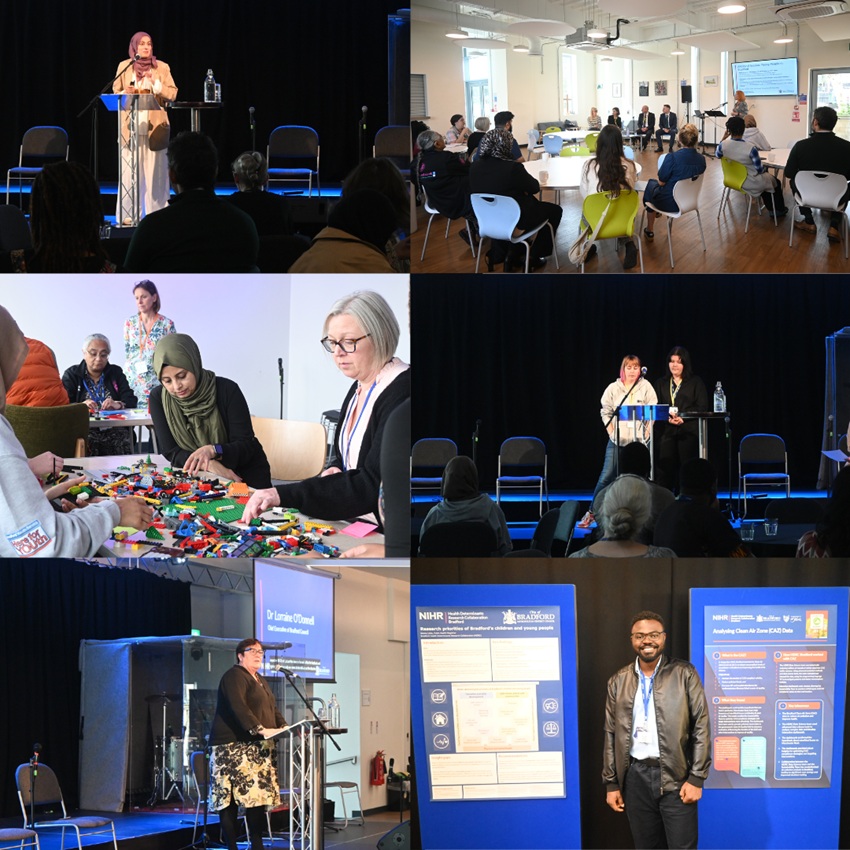HDRC Bradford Conference 2025

On Thursday, 18 September 2025, HDRC Bradford hosted an inspiring conference at Fountains Church, bringing together Bradford Council officers, the research community and voluntary sector partners to showcase our work so far and to launch our Areas of Research Interest (ARIs). The theme of the conference was ‘Improving Lives in Bradford by Putting Evidence at the Heart of Policy and Practice.’
The day opened with a powerful welcome from Bradford Council CEO Dr Lorraine O'Donnell, who spoke about the importance of understanding science and making evidence-based decisions in local government. This was followed by a passionate address from Professor Mark Mon-Williams, University of Leeds and Bradford Institute for Health Research, who highlighted the urgency of improving services for children across the Bradford district: “We have the solutions to hand as the evidence is clear.”
The ARI launch was an important moment, sparking rich discussion among panel members from Bradford’s research and voluntary sector communities as well as Council managers and youth workers. Together, they explored how we can collaborate to address identified evidence gaps and ensure that research informs real-world policy and practice. Key themes of the day were Child Poverty, The Bradford Labour Market and Young People in Bradford. The audiences expressed their passion and enthusiasm for the subjects in these sessions which was inspiring to see. As a reminder, the Council’s ARIs have now been published here.
In the afternoon, delegates were introduced to the incredible work of Bradford’s Youth Ambassadors, who not only presented their co-production approach with a fantastic video which highlighted the 3 key priorities of young people in the Bradford District, but also spent the day engaging with delegates, gathering insights from Council staff about the skills they would like to develop in their work and the barriers they face in becoming more research-active. The results of this survey are already helping to define the next steps in the HDRC’s training offer.
Three interactive workshops followed, designed to upskill council staff in:
Accessible Communication with Data
From our discussions at the workshop, a key takeaway was the power of data visualisation as a storytelling tool. We explored its potential to support council staff in making evidence-led decisions and implementing policy, whilst also helping residents in Bradford understand not just what is happening within the Council, but why. Another important insight was how visualisation can help challenge misconceptions, such as those surrounding Covid or Clean Air Zone, by presenting clear, accessible narratives. We also emphasised the importance of inclusive design, ensuring that visualisations consider people with impairments and disabilities from the outset. Whether used to engage the public, support advocacy, or communicate council priorities, we hope the session showed how visualisation acts as a vital bridge between data and dialogue. We hope everyone left feeling more confident in using it to inform, inspire, and connect.
Rapid Evidence Reviews
This session covered how research evidence can be beneficial in decision making, but how it can sometime feel overwhelming to sift and find appropriate evidence, and when you do find something, how to know if it is any good. We focussed in on the importance of crafting a good question to find relevant research evidence and gave participants a simple framework to do this, giving them the opportunity to try out the framework in real time. We then went through a simple process of critically appraising evidence, to help us begin to judge the quality and applicability of the research to what we are doing in Bradford. We hope that the resources provided gave people tools that they will be able to put to use in their everyday practice and will support them to feel confident in looking for and using research studies to enhance the quality of their work.
Using LEGO® as a Method of Community Participation
The goal of the workshop was to provide participants with an engaging and innovative forum for concept exploration, thought expression and experience sharing. Participants examined how innovative approaches such as LEGO can support inclusive, community-driven research by assisting communities, practitioners, and researchers in co-designing and co-producing solutions around the wider determinants of health. Participants constructed Lego models that reflected their ideas, experiences, and goals. The shared model illustrates how possibilities for learning, employment, and money impact one's life and well-being. Jobs, money spent on housing, transport, education, open spaces, hobbies, and access to technologies that enhance quality of life were all discussed. Everyone was able to share their experiences and insights in a creative and visual way by using these models as the foundation for group discussions.
Many participants reflected on how the session helped them think differently, present views more clearly, and have more inclusive conversations.
The HDRC Bradford team thanks Fountains Church for providing a welcoming, light-filled space that supported the collaborative spirit of the day. We thank delegates for attending and welcome future collaboration to continue improving lives in Bradford by putting evidence at the heart of policy and practice.